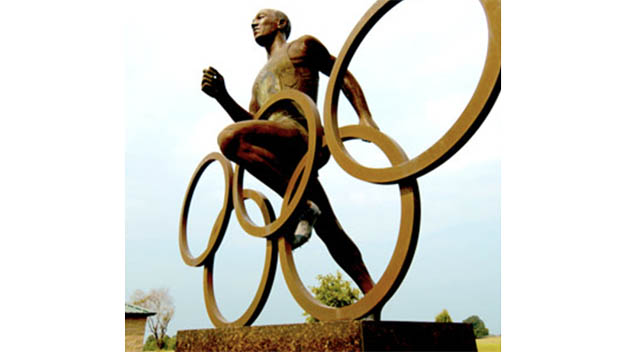Rare book given to Owens museum after Alabama man’s long quest to find it
Published 6:24 am Saturday, October 30, 2021
A quest to buy a book printed in 1936 with results from that year’s Berlin Olympics required two military tours of Germany, 20 trips to booksellers and $240, but the effort led to an Alabama man donating a copy of the book to the Jesse Owens Museum in Oakville.
Owens, an Oakville native, won four track-and-field gold medals at the Berlin Olympics, a feat that gained him international fame because it refuted German leader Adolf Hitler’s theory of Aryan supremacy.
Justen Burns of Springville said he found and purchased the 168-page Olympics “cigarette photo book” titled “Olympia 1936” in 2019. He and his wife Fabiola donated the 85-year-old book to the museum on Wednesday.
Trending
“I love history and with my appreciation for Jesse Owens and what he accomplished, I wanted the book,” said Burns, 41, who retired from the U.S. Army as a sergeant first class. “It showed the adversity he had to overcome. He went into Germany in 1936 with the Nazi regime at its height and to pull off four gold medals is pretty incredible. But actually, the gold medals were secondary to what he accomplished.
“There is no other situation I can find of an athlete going into a country that has openly voiced its disdain for any other race and here’s Jesse Owens comes in and bested their best. With all the negativity and all of the comments that came out, he put them all to bed that day. Nobody can deny what he did and he did it on a world stage.”
Owens became the first Olympian to win four gold medals. He set Olympic records winning the 100-meter dash (10.3 seconds), 200-meter run (20.7 seconds), long jump (26 feet, 5.25 inches) and the 4×100 relay (39.8 seconds).
Burns said during his seven years in Germany he likely went to more than 20 places to find the complete book. He said he saw about 100 copies of it, but most were in poor condition.
“I saw one in Nuremberg in 2008 and it fascinated me. So I went on my search to find the perfect one,” he said.
Burns said he bought one in 2010 when he was first returning to the United States. “Most of the pictures were in it, but a lot of the pages were torn, and the cover was marked up pretty bad. I gave it away when I knew I was going back to Germany.”
On his second tour of Germany, from 2017 to 2020, Burns continued his personal mission, which ended in Rothenburg ob der Tauber, a walled, medieval town founded in 1274, southeast of Frankfurt.
He went into an antique store there and inquired about the book.
“(The manager) took me through what was like a secret backdoor. She actually had three but only one was in pristine condition so I bought it,” he said.
It was complete with photos and had little wear on the pages and cover. He paid 200 euros, about $240, for the book listed in very good condition. The book is written in German.
It wasn’t long after he purchased it that he began thinking of donating it to the Owens museum in Oakville, the Lawrence County community where Owens was born in 1913.
Fabiola said she was shocked at first about his intention.
“I was surprised because he spent so much time invested in the search for it,” she said. “I asked him if he wanted to keep it in the family. He said it belongs in a museum for everyone to see.”
Burns said he was thankful she didn’t object too much.
“It is better to be in a museum. It honors his life so everybody can see it,” he said. “If I keep it, it will stay on my bookshelf and every now and then I might show it to friends and family. But it wouldn’t serve its purpose, which is to let everybody see what he had to go through to accomplish what he did. I can’t give the appreciation it deserves for what he did.
“It’s better here than on a shelf in a house. … Sometimes you have to bring the history to the people, especially some of the younger people.”
He said many people don’t realize Owens was one of 10 children born to a pair of Oakville sharecroppers.
“Some people don’t know he’s from Alabama,” he said. “A lot of your life is based on your upbringing. I’m sure he didn’t start running when he got to Ohio State. Something he learned here got him there. He was an exceptional athlete and a wonderful part of Alabama history and world history.”
Owens and his family moved to Cleveland, Ohio, when he was 9.
Nancy Pinion, director of the Jesse Owens Museum, said she is thrilled the Burnses donated the book.
“This rare book is a priceless addition to the museum collection,” she said. “We are humbled that Justen and Fabiola made the decision to donate it after searching for years throughout Germany for a pristine copy of this specific book only to make the difficult decision to place it in the museum. We invite everyone to come and see it for themselves.”
The museum at 7019 Lawrence County 203 is open 10 a.m. to 4 p.m. Mondays through Saturdays and 1 to 4 p.m. on Sundays.
The admission fee is $5.




